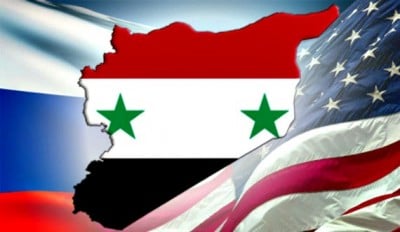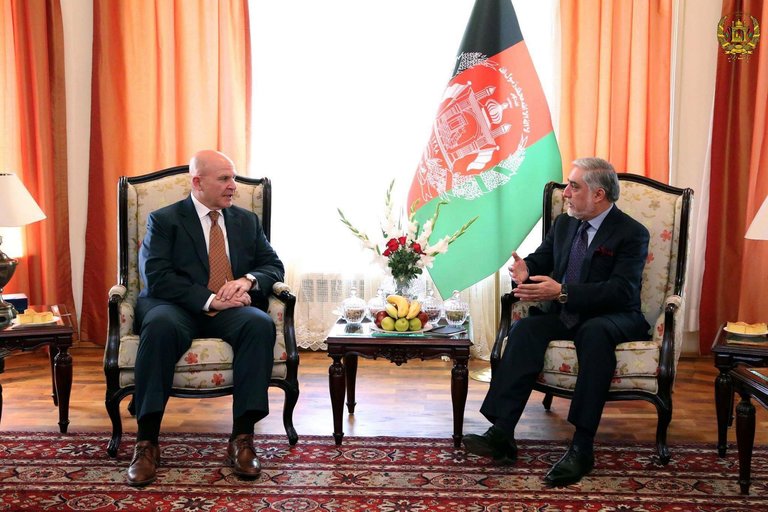Arab News
Raghida Dergham

The bargaining for a potential Russian-American deal on Syria has started. It is without a putative “grand bargain” that would take into account Ukraine and Western sanctions on Russia, which remain a less attainable goal at present.
Discussions are actually centered on Iran’s position on Syria and on a corridor and airbase to feed Hezbollah, which will not be able to maintain a presence on the Golan due to compliance with Israel’s strategic demands.
US Secretary of State Rex Tillerson’s visit to Moscow when he met with his counterpart, Sergei Lavrov, for nearly four hours and with President Vladimir Putin, indicates that a serious dialogue has begun between the Trump administration and Putin’s government. The dialogue will take into account the bilateral relationship and the elements of a potential deal with Syria as the starting point.
The US-British-French draft resolution at the UN Security Council condemning the use of chemical weapons in Idlib and calling for international inspection of Syrian airbases was met with Russia’s eighth veto. This occurred after the Russian envoy called for postponing the vote considering the few agreements reached between Tillerson and Lavrov.
Still, any sign of escalation in New York was tempered as discussions began in Moscow.
The US ambassador to the UN, Nikki Haley, gave an inkling into the US position vis-a-vis Russia in the Security Council which the US chairs this month and which stresses the “partnership” with Russia in Syria.
Lavrov and Tillerson agreed on several points — a belief in the need to preserve Syria’s territorial integrity and to collaborate in the fight against Daesh.
Calling for a unified Syria means in fact rejecting the partition started on the ground to benefit the Iranian idea of a Shiite “crescent” going through Syria.
Therefore, there is now talk of a corridor and airbase for Iran as a means to compensate Tehran which Moscow does not yet want to abandon.
To be sure, Moscow wants a deal with Washington, but not at any price. Both Russia and the US recognize that Bashar Assad will have to go sooner or later, and that he is just a temporary “hitch.”
Washington’s main message to Moscow is that the time is ripe for securing an exit strategy from Syria after guaranteeing some of its key interests there.
If not, Russia will inherit a broken Syria full of jihadists like Daesh, a US-empowered armed opposition, and the American intent to sink both Russia and Iran in a Syrian quagmire.
Moscow’s message to Washington is that it is ready to bargain, provided that the deal does not seek to undermine Russia’s prestige which has been restored by its intervention in Syria along with its strategic interests.
There is a wide range of issues on which the two sides might see eye to eye as a result of the US military strike in Syria, which paved the way for serious negotiations. American decision-makers working on Syria and a Russian role, within and without the US administration, comprise top military brass, well-versed in the region’s geopolitics. Haley won the admiration of this influential circle and is now the mouthpiece of the military-political policy-setting wing of the Trump administration.
The main message the US wished to send by its rapid military response to the use of chemical weapons in Khan Sheikhun was to draw red lines in the sand for Russia and Iran.
Its objective is to end the bloodletting in Syria and let the Kremlin know that the Trump administration is aware that Russian-Iranian policy in Syria is based on a military rather than a political solution.
Therefore, in a departure from Obama’s policy, the administration decided that military action was needed.
There are nearly 1,000 US troops and massive reconnaissance assets in Syria. Military plans have been drawn which enabled Trump to take the decision to strike almost instantaneously rather than arbitrarily.
He surrounded himself with expert military and political planners and exercised his role and powers as president based on professional, pragmatic advice.
These influential US foreign policy stakeholders want a strategic dialogue with Russia, but are looking to shape the future of their relationship from a position of absolute US military superiority.
In other words, their wager is that Russia will not dare confront the US militarily and that all its future moves in Syria will factor in US strength.




